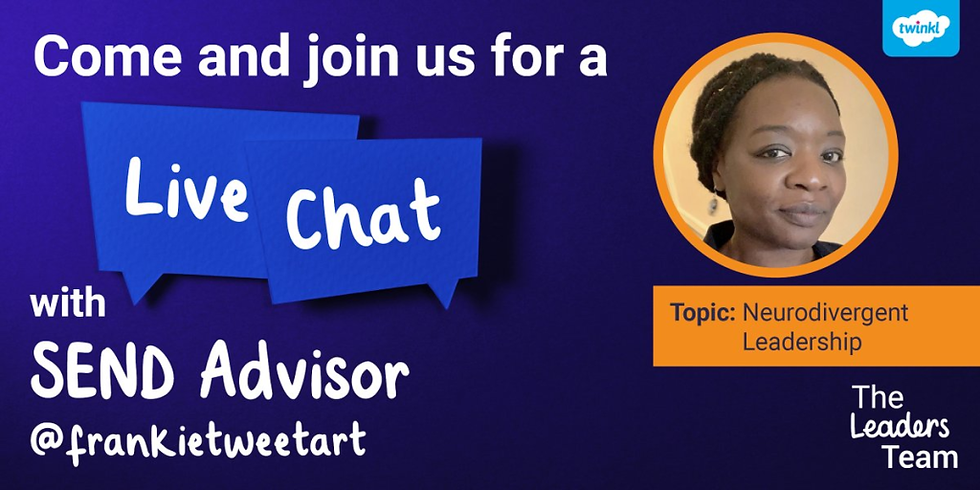Learning to understand my brain
- inclusionht
- Jan 18, 2023
- 3 min read
I have decided that my 2023 will be spent promoting a strengths based approach to Neurodiversity.
Neurodiversity is the concept that neurological differences are a natural and valuable form of human diversity. People with neurodiverse brains think, learn, and process information differently from most people.
But to help other people learn to understand how different types of brains work, it was important first for me to understand mine.
I always felt like I was different. I was fostered from a young age, went to a school in a predominately white area, loved art and an eclectic range of music whilst my friends didn’t. No-one had the same interests as me.
I wasn’t diagnosed as neurodivergent until I was 43. This was after I was diagnosed with a vestibular condition called Meneires. I had just returned from work after a couple of days off with a sinus infection. I was also experiencing vertigo & light headedness. A couple of colleagues suggested it might be menieres, which I had never heard of and told me to look into it. I had all the symptoms-
Frequent recurring episodes of vertigo
Nausea
Loss of balance
Fluctuating or progressive loss of hearing,
Ringing in the ear (tinnitus)
Feeling of fullness or pressure in the ear
The most striking thing for me was reading on the NHS website that Menieres is common in people that have had meningitis. I had it when I was 2 & 1/2 years old.
‘Meningitis is an infection of the protective membranes that surround the brain and spinal cord (meninges).’
‘It’s estimated up to 1 person in every 2 or 3 who survives bacterial meningitis is left with 1 or more permanent problems.’
Some of the most common complications associated with meningitis are:
hearing loss, which may be partial or total – people who have had meningitis will usually have a hearing test after a few weeks to check for any problems
recurrent seizures (epilepsy)
problems with memory and concentration
co-ordination, movement and balance problems
learning difficulties and behavioural problems
vision loss, which may be partial or total
loss of limbs – amputation is sometimes necessary to stop the infection spreading through the body and remove damaged tissue
bone and joint problems, such as arthritis
kidney problems
From May 2022, I spent 6 months researching into how my brain works and going for assessments including ENT & auditory assessments and an MRI scan. Each assessment seemed to lead to another diagnosis.
I understood from my research that meningitis can cause deafness and is linked to ADHD so I then started looking into this.
I have been assessed as having partial hearing loss in my left ear and I’m waiting for a hearing aid.
I have ADHD combined. Combined type attention deficit hyperactivity disorder (ADHD) is the most common of the three presentations of ADHD. The others are predominantly inattentive presentation and predominantly hyperactive-impulsive presentation. People like me with combined type ADHD, show both inattentive and hyperactive symptoms.
My Symptoms-
Inattentive type
Difficulty paying attention or listening
Losing important items ( all the time, I’m often sitting on my phone or looking for glasses that are on my head)
Being easily distracted
Forgetfulness
Having trouble paying attention ( hence why I like subtitles)
Appearing not to be listening
Making careless mistakes
Avoiding tasks that are just boring
Hyperactive-Impulsive Symptoms
restlessness
Trouble staying quiet
often “on the go”
overly talkative
The frequent urge to interrupt before I forget what I want to say (hence why I put myself on mute during online meetings)
It all made sense. When I was diagnosed with ADHD the assessor said that I could well also have dyslexia as well. I was surprised to see I met the criteria.
‘Dyslexia is a language-based learning disability often associated with slow or inaccurate reading, poor spelling, poor writing, or mixing up similar words. Auditory Processing Disorder is an abnormality in the processing of sound in the central auditory nervous system.’
From researching my own brain I am even more determined to use my lived experiences to support other people to fulfil their innate potential.
Things I can do to change the world (ADHDer’s have big dreams) are by-
-helping people to create an environment in the classroom and workplace that celebrates neurodiversity.
-Helping teachers and employees to foster a space where everyone feels respected and safe by recognising that everyone has different strengths and challenges.
-Encouraging people to be open to different ways of thinking—especially when it comes to problem-solving—and encouraging people to find their own paths towards success.
I feel that I have a much better understanding of how my brain works and how that impacts me as a person. Now I can use my experiences to help other people to succeed.






Comments